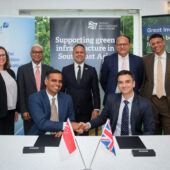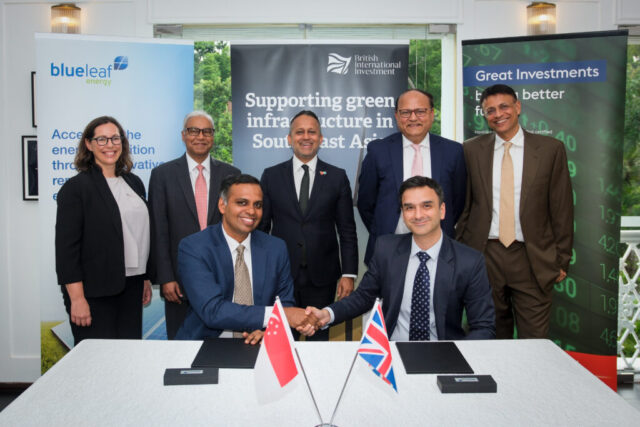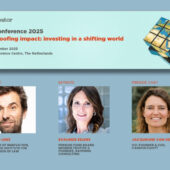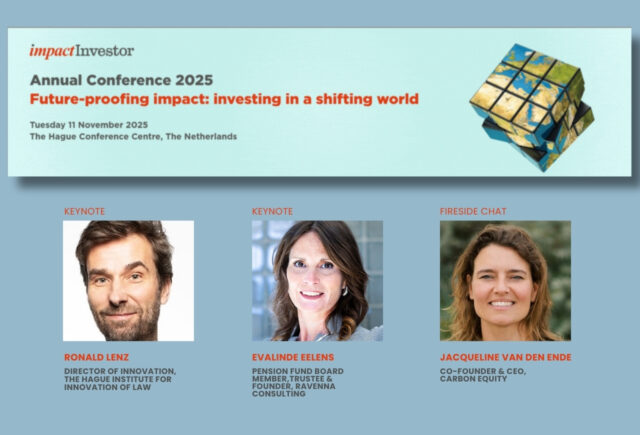Emerging markets are a central piece of the just transition puzzle. How are pension funds and other institutional investors redefining their emerging market exposure to support a fairer transition to a greener economy? From our ‘Impact Investing and the Just Transition’ report.

Emerging markets are a central piece of the just transition puzzle. How are pension funds and other institutional investors redefining their emerging market exposure to support a fairer transition to a greener economy?
Any effective global investment strategies aimed at tackling climate change must include a focus on emerging markets, due to the predicted high levels of emissions coming from those countries over the next few decades, and their increased vulnerability to the effects of climate change.
According to the World Economic Forum, emerging markets and developing economies accounted for over 95% of the increase in global greenhouse gas emissions during the last decade.
Additionally, the UN estimates that developing countries face a $4trn (€3.7trn) finance gap to fulfil the Sustainable Development Goals (SDGs) required to tackle the climate crisis.
However, while speed is needed now more than ever, it is this accelerated pace towards net zero that the investment community acknowledges will also bring disruption to the communities living in the regions which will be most impacted by the effects of climate change.
With this in mind, it is crucial that institutional capital for a transition to net zero is not only increasingly mobilised but also done in a way that doesn’t leave large groups of the population behind, taking into account the principles underpinning the concept of a just transition.
Historically, emerging market risk-reward perception has negatively impacted capital flows into the region, something that many believe needs to be urgently reversed if we are to win the fight against climate change.
SDG-focused strategies
ImpactA Global, an impact investment advisory firm specialising in the provision of debt financing for sustainable infrastructure projects in emerging markets, is among some of the players looking to finance impact outcomes across key sectors required to address vital SDGs.
The firm focuses on projects in the sectors of clean energy and renewables, sustainable mobility, health, and water and sanitation, most notably in Latin America, the Caribbean, Africa and South Asia.
Last year, Legal & General Capital, part of the UK’s insurance and financial services group Legal & General, committed up to $100m (€95.3m) to ImpactA which will predominantly focus on addressing climate change and reducing inequalities.
Part of the firm’s focus is on how its investments directly impact women in these regions, due in part to the fact that women are 14 times more likely to be impacted by a climate disaster than men, as women and girls are usually responsible for securing food, water and firewood for their families.
Currently, around four out of five people displaced by the impacts of climate change are women and girls, according to a UN report.

ImpactA Global co-CEO Victoria Miles and her team are working with export credit agencies on a number of healthcare and water projects across various regions. Miles is aware, however, of the obstacles which stand in the way of meaningful investment in those regions.
“When it comes to renewable energy, you’ve got to understand how the framework works in that market, and what contractual protections are available for creditors. What I would love to see is a system where countries and markets are rewarded for standardising those frameworks by having accelerated access to a guarantee from one of the DFIs through a first loss guarantee arrangement,” Miles says.
An example of this was seen last year when Allianz Global Investors and FMO Investment Management, the investment arm of Dutch development bank FMO, agreed on one of the biggest blended finance funds on record, raising $1bn (€929m) to invest n loans helping emerging countries achieve sustainable development.
Pension funds
Danish pension giant PensionDanmark, currently has around €7bn allocated to impact projects. For PensionDanmark’s head of ESG and sustainability, Jan Kæraa Rasmussen, private capital is a prerequisite for establishing and scaling up renewable energy in emerging markets and developing countries, where there is a need not only to transform the energy supply but also to expand it generally to keep up with population and economic growth.
“This opportunity presents a variety of dilemmas, including the need to ensure that our actions do not impede local communities’ access to essential energy resources by imposing impractical and unrealistic demands on transitioning the energy supply in developing countries.
“In the Global South, a just transition is about much more than to mitigate loss of a few coal mining jobs. The crucial question is to recognise the justified demands of access to stable electricity and other energy sources that we take for granted in Europe,” says Rasmussen.
These efforts dovetail with the Emerging Markets Just Transition Investment Initiative undertaken by a group of UK pension funds, representing 18 million members with assets of £400bn (€466bn), committed to collaborate to support the transition in emerging markets.
Daniel Spencer, portfolio manager at the Brunel Pension Partnership, part of the initiative, mirrors Rasmussen’s view, adding that pension funds with real-world decarbonisation targets should seriously consider an allocation to emerging markets.
“Funding for emerging markets is required in both public and private markets, leaving pension funds well placed to support these economies in achieving their climate targets,” Spencer says.
“Our approach to climate transition in emerging markets has always been focused on alignment, which allows us to funnel capital to the areas with the potential to align. This approach reconciles with the advocacy principle of the just transition initiative, particularly on sharing the benefits of a green economy. This is opposed to carbon intensity targeting, where poor data can often eliminate companies or entire countries from the investable universe; this often results in a deprivation of capital from where it is most needed,” Spencer adds.
This is a particular problem in countries with high scope 2 emissions like South Africa and India, due to the amount of coal in their power generation mix, he adds.
Currently Brunel’s emerging market equity fund invests in China Longyuan, the largest wind producer in Asia. The company holds a number of legacy coal assets which it has committed to divest. This type of situation reconciles with Brunel’s climate change policy, adds Spencer, as it focuses on alignment over carbon intensity.
“This allows capital to flow into companies with a genuine potential to transition. China Longyuan also aligns well with the goals of the Chinese government, given their commitment to be net zero by 2060,” Spencer says.
Multilateral development banks
In addition to investment from pension funds, the role multilateral development banks (MDBs), and the funds which engage with them, have to play cannot be overstated.
Among these is the ILX Fund, an SDG-focused private credit fund that invests in private sector loans in emerging markets and developing economies (EMDE) arranged by MDBs.
The fund contains a portfolio of loans that finance EMDE projects delivering SDG-targeted impact and includes green and transition investments. Institutional investors then participate in the fund to effectively co-invest in syndicated loans originated and structured by MDBs. Investors in the fund include APG which invested $750m on behalf of Dutch pension fund clients ABP and bpfBOUW.
For ILX founder and CEO Manfred Schepers, standardisation and transparency are crucial for blended finance and pension fund investments to scale and grow.
The potential grow for pension fund investments in emerging markets is in the hundreds of billions, according to Schepers who adds there is currently a lack of transparency available to investors.

“There needs to be an increased level of standardisation in the way investments are done and in the way these assets are shared. As well as the transparency on the underlying data.
“Direct investment is good and the pension funds like it as it suits their mandates and portfolios. But the marketplace, such as development finance institutions, need to work really hard on that standardisation, harmonisation and transparency because that will enable the market to scale up,” Schepers says.
In addition to this, he also warns against the market sleepwalking into viewing blended finance as the sole solution for funding EM projects.
“Keep things simple. Markets are created by understanding granular levels of risk. These ‘portfolio slicings’ sometimes work because rating agencies have the data, but that’s not the solution, the solution is transparent risk transfer,” Schepers adds.
Last year, ILX partnered with British International Investment (BII), the UK’s development finance institution, in a project which will co-finance up to $500m of debt transactions to facilitate long-term sustainable development across Africa, Asia, and the Caribbean.
Regional differences
The full emerging markets just transition picture is not just about funding renewables, however, and must factor in the need to build resilience in order to adapt to climate change. Any approach must also focus on ensuring a transition strategies in emerging markets including considerations of affordability, availability, economic growth, and sustainability.
For BII CEO Nick O’Donohoe, it is paramount to remember that different markets require different solutions. Adding to that, disentangling economic growth from higher emissions is crucial in achieving a just transition.
“What is necessary and needed in Africa is very different from what is needed in Asia,” O’Donohoe stresses.
It is this lack of recognition that risks markets and investors not making sufficient allowances for the distinct pace of change needed in different regions.
“In Asia, you’ve got markets that are growing and developing very quickly, as well as increasingly large pools of local capital and banks have larger balance sheets. But on the other hand, they have a much bigger problem in terms of a transition to net zero, because everybody in those countries largely has access to power which is powered to a very large extent by coal.
For Jodi-Ann Wang, sustainable finance policy analyst at LSE Grantham Research Institute, the just transition is also about creating opportunities within emerging market communities, and not just mitigating risk.
“We define just transition as not only focusing on minimising the risks to workers, communities, supply chains, consumers, but also about maximising opportunities,” says Wang.
In addition to this, Wang says a just transition can also ensure that the next generation of the workforce builds new skills required to ensure we are living in a greener energy system.
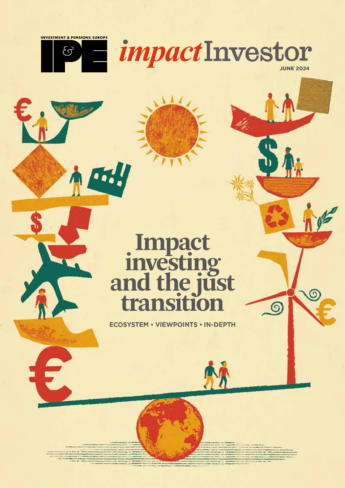
This article is part of the ‘Impact Investing and the Just Transition’ report, a collaboration between Impact Investor and our sister publications IPE and IPE Real Assets.
You can download a digital copy of the report here.


